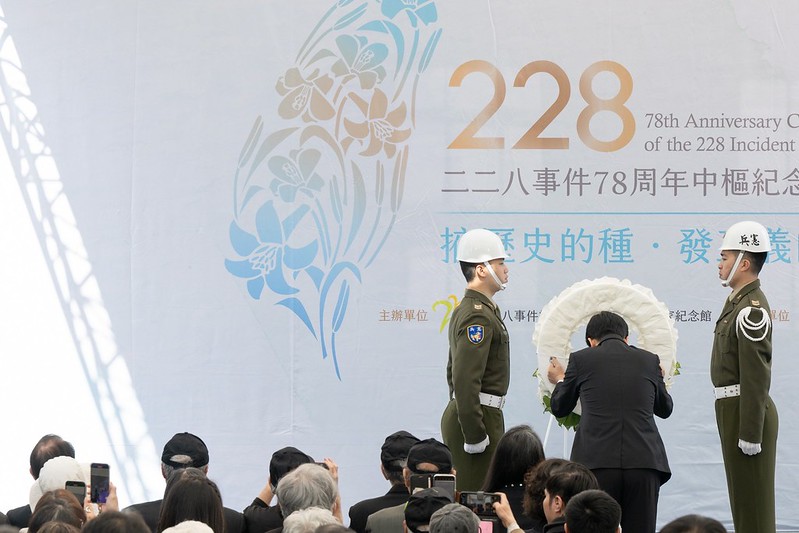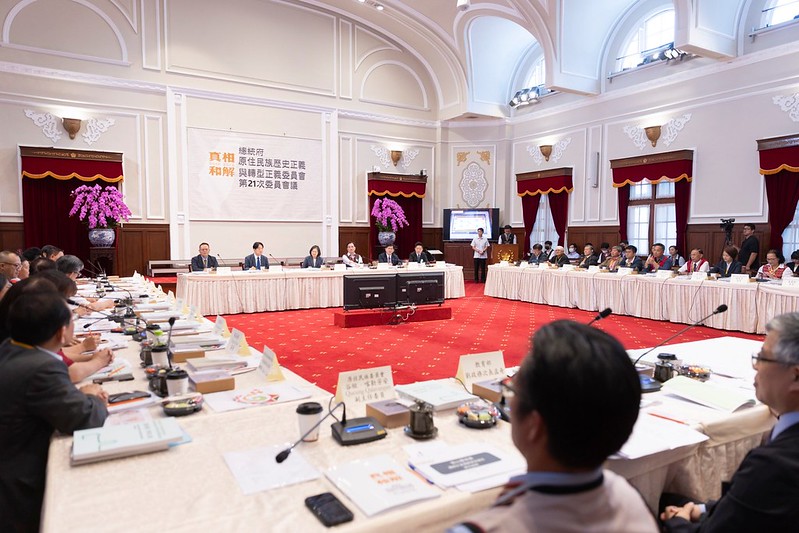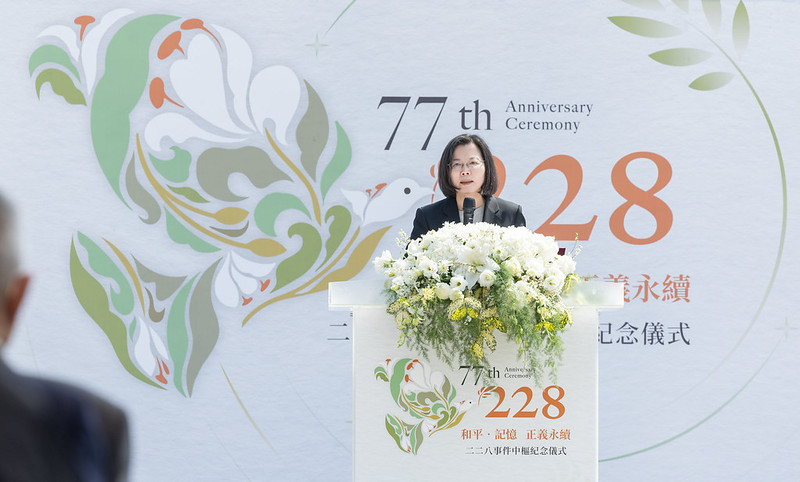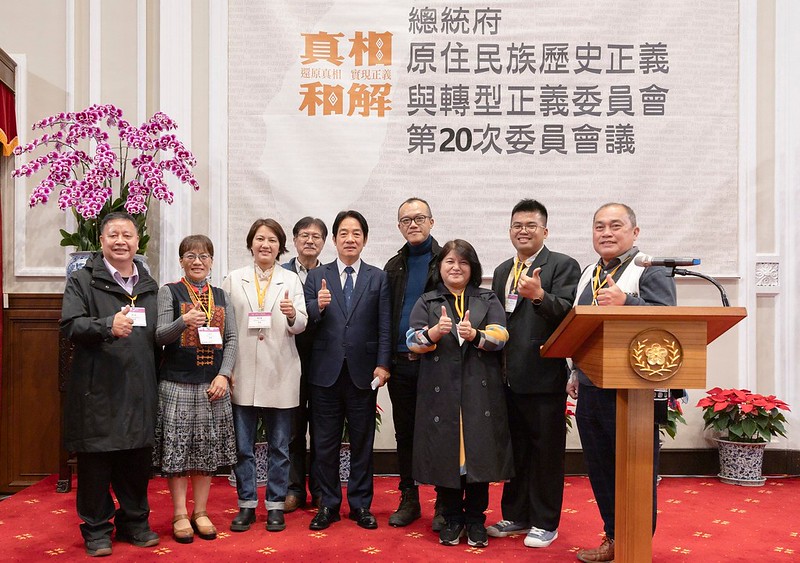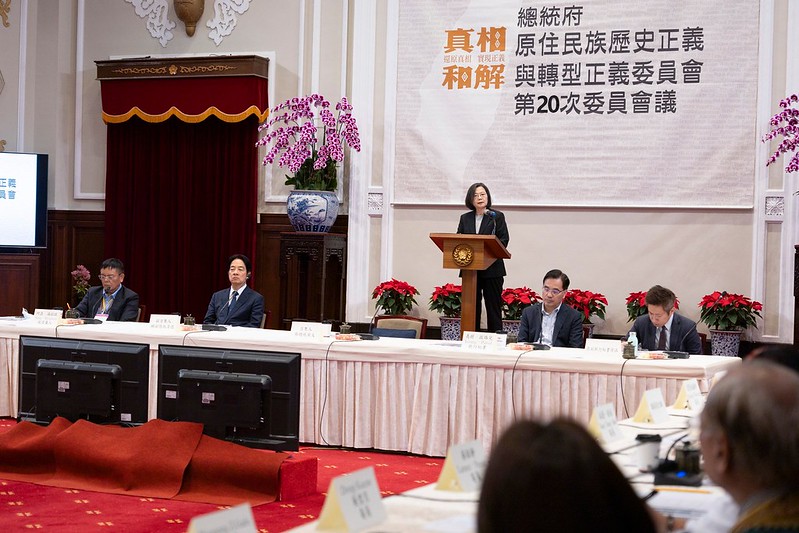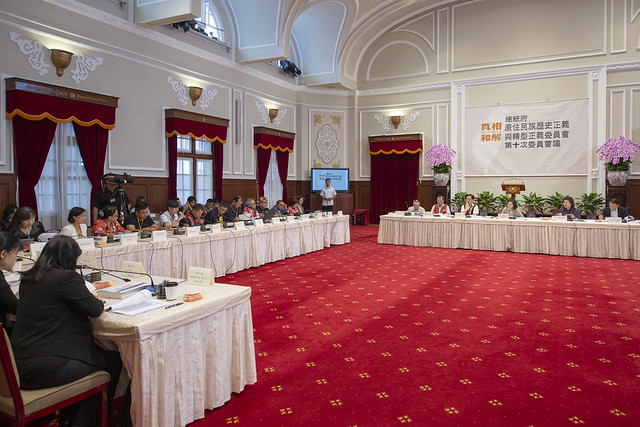News & activities
 News releases
News releases
Committee Convener President Tsai Ing-wen presided over the 10th meeting of the Presidential Office Indigenous Historical Justice and Transitional Justice Committee (the Committee) on June 18. The meeting ran for approximately two and a half hours.
At the meeting, the Subcommittee on Culture and the Subcommittee on Reconciliation presented progress reports on their work, and the Committee discussed proposals regarding "traditional indigenous place names" and "categorization and public access for Committee documents."
Agilasay Pakawyan (林志興), the convener of the Subcommittee on Culture, delivered a presentation entitled "The Justice of Giving Back My Name: How the Policy of Assimilation Undermined Indigenous Naming Customs and Kinship Systems." Afterward, Deputy Minister of the Interior Chen Tsung-yen (陳宗彥) and Council of Indigenous Peoples Minister Icyang Parod (夷將‧拔路兒) commented on the presentation and exchanged views with Committee members. President Tsai then expressed the following three views:
First, the president thanked the Subcommittee on Culture for its report, which she said clearly showed both past and present challenges that traditional indigenous naming customs have faced.
Second, the report clearly shows that when the government amended the Name Act to safeguard the right of indigenous peoples to restore their indigenous names, it was not granting them "extra privilege." Rather, the government was returning a right that had previously been wrongfully stripped from them. This is historical justice in action.
Third, it is apparent from the percentage of indigenous peoples who have resumed the use of their indigenous names that our related legislation and policies need to be more detailed and thoughtful. Taiwanese society as a whole still has more to learn about traditional indigenous names as well. The Council of Indigenous Peoples, the Ministry of the Interior, and all sectors of society need to continue working on this front. The president also called on the Ministry of the Interior to resolve difficulties surrounding the romanization of indigenous languages.
The progress report by the Subcommittee on Reconciliation was presented by its convener, Bavaragh Dagalomai (謝若蘭), who described the Subcommittee's experiences with the collection of information on reconciliation customs among Taiwan's various ethnic groups, the comparison of findings with indigenous transitional justice cases overseas, and the use of societal communication to spur broad-ranging dialogue. After exchanging views with Committee members, President Tsai expressed the following two viewpoints:
First, the president thanked the Subcommittee on Reconciliation for its hard work. In the video they had just watched, one particular statement made a deep impression on the president: "This is a trip in which we move from the 2% of society comprised by indigenous peoples toward the other 98% of society." The president pointed out that if we want the social engineering programs of historical justice and transitional justice to move forward and continue on, we indeed need to engage in more communication and dialogue.
Second, President Tsai pointed out that the Subcommittee on Reconciliation's experience is a model for how to promote transitional justice for all ethnic groups. In addition to praising the Subcommittee for its efforts and encouraging it to keep up the good work, the president also urged Committee members and government officials to consider the Subcommittee's experience and act in the spirit of "ethnic mainstreaming" by working to spur better understanding and increased interaction among different ethnic groups.
During the meeting, Committee members made a total of 22 proposals and four extemporaneous motions. One proposal came from Committee member and Truku tribe representative Teyra Yudaw (帖喇‧尤道), requesting the restoration of indigenous names for townships, villages, and roadways. Shu-ya Lin (林淑雅), an academic expert on the Committee, put forward another proposal that the National Archives Administration should be instructed to categorize the documents of the Committee's thematic subcommittees and make them available for public access.
After Deputy Minister of the Interior Chen Tsung-yen and Council of Indigenous Peoples Minister Icyang Parod explained the current status of legislation and policies regarding traditional place names, President Tsai concluded by instructing as follows: Under existing legislation, we do indeed have room to resume the use of traditional indigenous place names. The government will certainly support any such decision, so long as it complies with the law and enjoys consensus support among local residents of all ethnicities.
After National Archives Administration Director-General Lin Chiu-yen (林秋燕) commented on the proposal regarding the management of archival records, President Tsai instructed as follows: The Committee's staff, subcommittees, and the National Archives Administration should discuss and come up with a concrete proposal together.
In addition, a number of Committee members at this meeting focused their attention on the progress of efforts to amend the Mining Act and the Status Act for Indigenous Peoples. President Tsai made the following three statements:
First, she said she had indeed pledged to complete amendments to the Mining Act and the Status Act for Indigenous Peoples. She asked Committee members to rest assured that her commitment remains unchanged.
Second, deliberations for both amendment bills by Legislative Yuan committees have already been completed, and negotiations have narrowed the gaps between opposing positions. The president said she respects the views of the ruling and opposition party caucuses, and continues to closely follow developments.
And third, the president understands that each Committee member hopes the amendments will be passed as soon as possible. However, the Legislative Yuan has recently called a special session and already has many bills on the agenda, so the legislators have a tough task ahead of them. The president said she will inquire into the possibility of these two amendments being put on the legislative agenda for the special session. If that isn't possible, then she hopes that the party caucuses can work during their next and final legislative session to complete amendments and make good on the government's pledges to the indigenous peoples.
